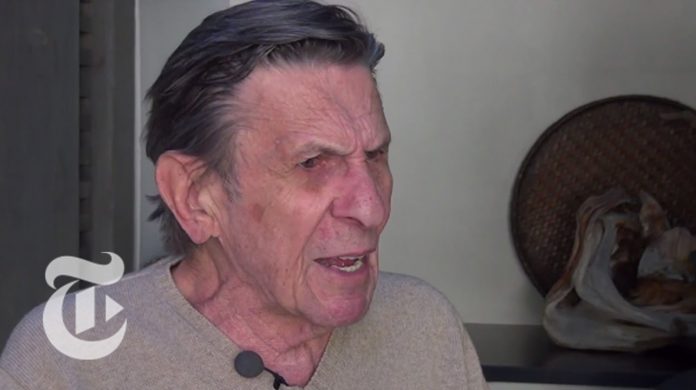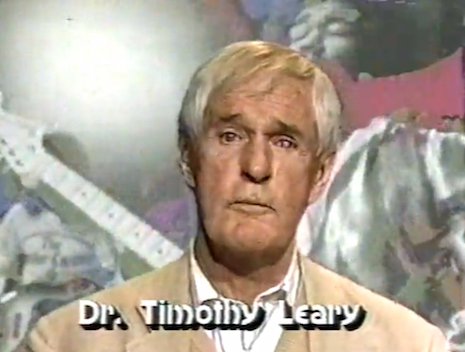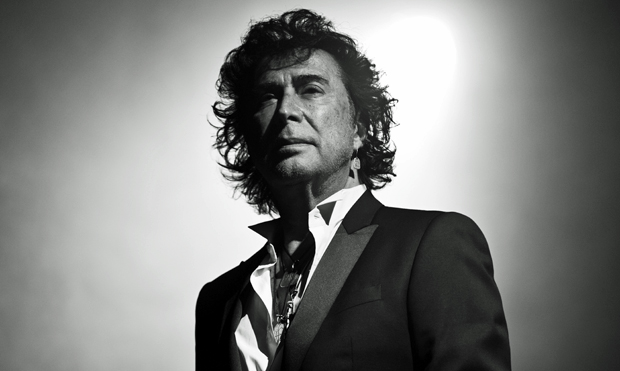Fred Rogers’ Final Message to those who grew up with the Neighborhood
Shortly before he died 12 years ago, he recorded a brief video message to the adults whom he taught and grew up and older with through his television work. It was only a few days ago that the Fred Rogers Company released the video to the public.
Fred Rogers Message to those who grew up with the Neighborhood from The Fred Rogers Company on Vimeo.
Leonard Nimoy Explains Origin of Vulcan Greeting
As part of the Yiddish Book Center Wexler Oral History Project, Leonard Nimoy explains the origin of the Vulcan hand signal used by Spock, his character in the “Star Trek” series.
A Rap Battle You Can Only Compliment Your Competitor
Don’t Flop Entertainment organizes rap battles…with a twist. As most rap battles are insult-fests, this battle has a twist: you can only compliment your opponent. 8 Mile and Eminem would have turned out a bit different…
Stream “The UK Gold” Soundtrack Featuring Thom Yorke, Johnny Greenwood, Massive Attack’s Robert Del Ninja, and Elbow’s Guy Garvey
“The UK Gold” follows the dramatic battle of a vicar from a small parish in the London Borough of Hackney as he goes head to head with an ancient and mighty heavyweight, revealing its central status as the tax-haven nerve centre of the world.
As if that doesn’t sound like enough to make you want to see it already, its soundtrack was composed by Thom Yorke, Johnny Greenwood, Massive Attack’s Robert Del Ninja, and Elbow’s Guy Garvey. Take a listen to it below.
Jimmy Page On The Artist Who Most Changed His Life
Forty years ago this week, Led Zeppelin released the band’s monumental sixth album, the double LP Physical Graffiti. This is a great time as any for Jimmy to look back at his biggest influence:
There was this sort of explosion of music that happened for the youth in the ’50s. And quite clearly it was rock and roll, but also what we had over in England was this guy Lonnie Donegan. And he spawned the whole skiffle movement and caught people’s imagination. And he was superb. He was absolutely superb, but there he was playing like an acoustic guitar and doing these performances. Every Saturday there would be a show on the television where usually he was on, every other week, and it was just something to behold at the time. Just his whole passion and the way that he delivered his material. Now the thing is that he’d been in a jazz band prior to that, Chris Barber’s Jazz Band, and Chris Barber was very much somebody who … he played trombone, Chris Barber, but he was very much into the blues. In fact, he was behind getting Muddy Waters to visit in England in the ’50s. Absolutely astonishing stuff, isn’t it? And so when Lonnie Donegan was playing the banjo in his sort of traditional jazz band … I guess when Lonnie Donegan wanted to sort of do these songs, [Barber] was fine with it. Bringing through the sort of blues, American country blues and all of that. So Lonnie Donegan is playing “Rock Island Line.” Which at the time, obviously, we thought it was a Lonnie Donegan song, but it sort of goes back more to the sort of roots of Leadbelly. And he really understood all that stuff, Lonnie Donegan. But this is the way he sort of, should we, say jazzed it up or skiffled it up. But it was to the point where so many of the guitarists from the ’60s will all say Lonnie Donegan was the influence.
Via NPR
That Time Dr. Timothy Leary Was A VJ On MTV
In 1987, Dr. Timothy Leary was hied by MTV to be a guest VJ. The good doctor had more than a few things to say than the usual tour date listings or gossip about artists – Here’s his set up for David Bowie’s “Let’s Dance”:
Now this is a real heavy one—I don’t know what this means. It has something to do with the third world and the exploitation by the first world and our hopes that the third world will get behind the camera and start becoming part of the cybernetic age. I don’t know. Watch it and make up your own mind. It’s a good tune.
Born deaf, Christine Sun Kim uses technology, performance and drawing to study sound and spoken languages
Christine Sun Kim, deaf from birth, creates art at the intersection of sound, language, and music. From Medium:
Can you tell me about the various ways that you experience sound without hearing it? I’m curious how this ties into your artwork and the various ways you explore.
For a piece called “Feedback Aftermath,” I played with feedback for hours one night and then went home. At home I didn’t feel good — [I] felt anxious. I couldn’t sleep well that night, and I didn’t want to go back to the studio for one week. That was disconcerting. And then when I watched the video of myself — because I videotape myself sometimes — I felt sort of stressed out and uneasy. Later I realized that it had an impact on me, an extreme impact, like post-traumatic stress. Most hearing people don’t experience that. You have warning signals. If your ears hurt, you leave the room, you stop, you step away. I don’t have those signals, so I went past all warnings and experienced feedback to the full degree.
The Official Nintendo Character Manual From 1993
Blake J. Harris from Press The Buttons has offered up a very cool look at the inside of the official Nintendo Character Manual from 1993 that features details for “any public performance of the Mario character” and more. There are lots of fun facts about classic Nintendo heroes and villains such as Yoshi’s real name (T. Yoshisaur Munchakoopas) and mushroom retainer Toad’s original hometown (he has family in the Fungus Federation).
Andy Kim Gets It Right When It Comes To Not Having Any Regrets
Andy, your career has stretched over decades, and you’ve been involved in so much pop iconography its sometimes hard to digest. So for you, looking back on everything that you’ve done, what has been your biggest regret, and, conversely, what has been your proudest accomplishment?
Andy Kim: I have no regrets. I have not one single regret. I was born with a wonderful DNA where I felt that my life was not a race against someone else or another artist. It was probably internal, ya know? I needed to this. I didn’t know why and I didn’t understand. I don’t come from a musical family and didn’t go to Julliard or anything, but I had this kind of vision of stuff that was so powerful that I just needed to find it. I have no regrets. There are times when, for many years, I’ve been irrelevant—and it was OK! I had my moment. No one is responsible for anyone else’s dreams. I don’t need a babysitter. I just needed to know that I could do this. I just think that my happiest time or my best time, upon reflection, is that I had the courage to do this. I had the courage to go to an environment that was the Brill Building and was actually welcomed but I had the courage to take this step.
Via Pop Matters











